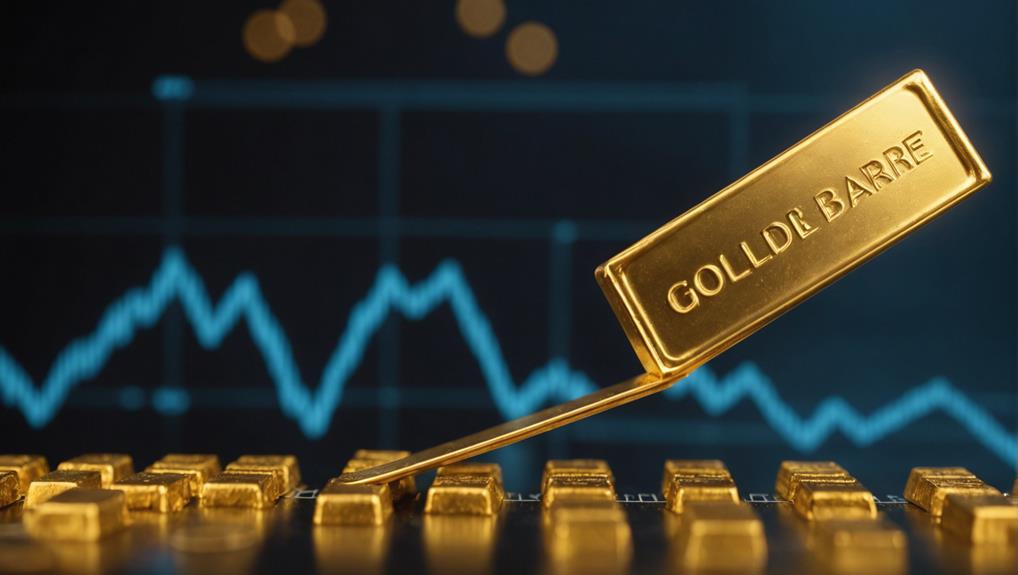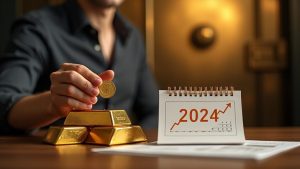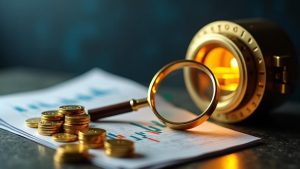Peter Schiff, a prominent economic pundit, advocates for investing in gold due to its historical track record and diverse advantages.
One key reason Schiff champions gold is its ability to hedge against inflation, consistently preserving purchasing power even in times of currency devaluation.
Additionally, gold is considered a reliable safe haven asset during economic turmoil, often maintaining or increasing in value when other investments falter.
Furthermore, given concerns about a potential collapse of the U.S. dollar stemming from escalating debt and government spending, Schiff posits that gold could serve as a crucial protective measure.
But how reliable are these assertions, and what evidence supports them?
Key Insights
- Gold serves as a hedge against inflation, preserving purchasing power when fiat currencies lose value.
- Gold acts as a safe haven asset during economic crises, retaining or increasing its value.
- Investing in gold mitigates risks from potential U.S. dollar devaluation due to excessive national debt.
- Physical gold ownership provides direct control and shields investors from counterparty risks associated with paper gold.
- Diversifying portfolios with gold can protect against stock market bubbles and financial turbulence.
Protection Against Inflation

Peter Schiff argues that gold is a robust hedge against inflation, especially in times of excessive central bank money printing that threatens the stability of fiat currencies.
Unlike paper assets that depreciate with inflation, gold maintains its purchasing power due to its inherent value and limited supply. This quality makes gold an attractive asset for individuals looking to protect their wealth from the erosive impacts of inflation.
As fiat currencies lose value, gold tends to appreciate, offering investors a reliable shield against inflation. Allocating funds to gold investments can help preserve wealth during periods of currency devaluation.
Hedge Against Economic Crises
Gold has a long-standing reputation as a safe haven asset, known for retaining or even increasing in value during economic uncertainties.
Peter Schiff advocates for gold as a hedge against financial crises, citing its historical resilience in times of instability.
When currencies undergo devaluation, gold's enduring value and limited supply make it an attractive wealth preservation tool.
Investors frequently turn to gold to shield their assets from market fluctuations and ambiguity.
Schiff stresses that owning physical gold can mitigate risks associated with currency devaluation and broader financial disruptions, positioning it as a strategic investment to fortify portfolios against economic turmoil.
U.S. Dollar Collapse Predictions

Peter Schiff's predictions about the potential collapse of the U.S. dollar stem from concerns over excessive national debt and unchecked government spending. He warns that such financial instability could jeopardize the U.S. dollar's status as the world's reserve currency, leading to broader economic repercussions.
Consequently, Schiff advocates for investing in gold as a hedge against this risk, emphasizing its potential stability in the face of a declining dollar.
Reserve Currency Risk
Amid escalating concerns regarding soaring debt levels and expansive government spending, the potential jeopardy of the U.S. dollar's supremacy as the world's reserve currency has captured the attention of economic experts such as Peter Schiff.
Schiff foresees a scenario where the U.S. dollar's decline could have far-reaching repercussions on global financial markets, triggering widespread economic turmoil. He attributes this risk to the excessive debt burden and fiscal recklessness exhibited by the U.S. government, which exacerbate the vulnerability of the reserve currency status.
To counteract these looming threats, Schiff advocates for allocating investments towards gold, citing its status as a reliable safe-haven asset. With its enduring intrinsic value and historical resilience, gold emerges as a prudent safeguard against the uncertainties associated with a potential currency crisis, offering a viable hedge against the adverse impacts of a weakening U.S. dollar.
Economic Instability Hedge
Peter Schiff strongly advocates for investing in gold as a strategic hedge against potential economic instability. He believes that gold, a safe-haven asset, holds its value more reliably than fiat currencies during times of financial turmoil and inflation.
Schiff warns that the dollar's position as the world's reserve currency is precarious, increasing the risk of devaluation. Hence, he recommends diversifying investment portfolios by allocating a portion to gold based on these forecasts.
According to Schiff, gold serves as a shield for investors, safeguarding them from the negative impacts of economic instability, making it a prudent choice in unpredictable financial markets. This strategic approach aims to mitigate potential losses stemming from currency devaluation and broader economic disruptions.
Safe Haven Asset
Gold is widely recognized as a safe haven asset, sought after by investors for its stability during economic uncertainty and market volatility. Peter Schiff emphasizes the role of precious metals, like gold, in wealth preservation, attributing its enduring value and consistent performance as key factors in safeguarding assets.
The appeal of gold as a safe haven asset stems from its ability to:
- Hedge Against Inflation: Gold's value tends to hold steady even when traditional currencies depreciate.
- Protection from Currency Devaluation: Gold serves as a reliable store of wealth amidst currency fluctuations.
- Geopolitical Risk Mitigation: The stability of gold remains intact in the face of political upheavals.
- Physical Security: The tangible nature of gold adds a sense of security to investment portfolios.
These characteristics solidify gold's reputation as a dependable safe haven asset for investors looking to mitigate risks and preserve capital.
Criticism of U.S. Monetary Policy

Peter Schiff criticizes U.S. monetary policy. He argues that inflationary government spending and the Federal Reserve's low interest rates and quantitative easing measures significantly devalue the dollar. He asserts that these policies erode the purchasing power of fiat currencies and pose risks to economic stability.
Moreover, Schiff warns that the government's deficit spending and growing debt accumulation lack fiscal discipline. He believes that this undermines long-term economic health.
Inflationary Government Spending
Peter Schiff criticizes U.S. monetary policy, warning about the dangers of inflationary government spending and its detrimental impact on the economy. He emphasizes that excessive government expenditures can trigger economic crises, as seen in severe downturns.
Moreover, the increased money supply without corresponding economic growth leads to inflation, ultimately devaluing the dollar and eroding purchasing power. To safeguard against these risks, Schiff recommends investing in gold coins, highlighting their stability as a store of value amidst fiscal uncertainty.
Federal Reserve Policies
Schiff criticizes the Federal Reserve's monetary policies for contributing to the devaluation of the U.S. dollar, in addition to concerns about inflationary government spending. He asserts that the Fed's strategies, such as maintaining low interest rates and engaging in quantitative easing, diminish the purchasing power of the currency. These actions, according to Schiff, generate inflationary pressures that disrupt the economy's stability.
He cautions that the Federal Reserve's interventions distort markets and inflate unsustainable asset bubbles. Schiff argues that the central bank's monetary decisions undermine economic equilibrium, prompting investors to consider gold as a valuable investment option. Holding gold allows investors to safeguard their wealth against inflation and market distortions instigated by the Fed's policies, providing a hedge during times of monetary uncertainty.
Dollar Devaluation Risks
Peter Schiff and other experts caution against the risks of dollar devaluation due to extensive government spending and loose monetary policies. Schiff specifically criticizes the reliance on fiat currency in the U.S., emphasizing how inflationary measures can devalue the dollar and diminish purchasing power.
This situation underscores the appeal of gold bars as a hedge against these risks. Schiff's concerns can be summarized as follows:
- Government Spending: Rampant fiscal policies escalate national debt, fueling dollar devaluation.
- Money Printing: Aggressive monetary strategies boost the money supply, resulting in inflation.
- Value Erosion: Fiat currency steadily loses value, impacting wealth retention negatively.
- Gold as a Hedge: Gold bars offer a stable store of value, shielding against dollar devaluation.
Investing in gold thus presents a viable means to protect against potential monetary instability.
Physical Gold Vs. Paper Gold
Peter Schiff staunchly advocates for physical gold over its paper counterpart, emphasizing its tangible nature and intrinsic value. He argues that owning physical gold offers direct ownership, shielding investors from the counterparty risks associated with gold ETFs and futures.
By holding physical gold, whether in a gold IRA or as bullion, individuals secure a real, scarce asset impervious to dilution and manipulation, in stark contrast to paper gold products. Schiff believes that the lack of security and stability in paper gold makes it more susceptible to market fluctuations and systemic risks.
His preference for physical gold reflects his broader belief in gold as a reliable store of value and a hedge against economic uncertainties.
Stock Market Bubble Concerns

Peter Schiff, a proponent of physical gold investment, is sounding the alarm on a potential stock market bubble. He cautions investors about the looming threat of overvalued stocks leading to substantial financial losses.
In light of the economic uncertainty and the volatile nature of traditional investments, Schiff urges investors to consider diversifying their portfolios by including gold as a safe haven asset. Gold, known for its historical stability during financial crises, can provide a hedge against the risks posed by an impending market downturn.
Dollar Devaluation and U.S. Debt
Expressing concerns over the potential devaluation of the U.S. dollar due to extensive money printing and escalating government debt, Schiff emphasizes the need for safeguarding wealth in uncertain economic times.
With the U.S. national debt surpassing $28 trillion, the risk of dollar devaluation looms large, prompting worries about the currency's purchasing power. Schiff advocates for gold as a reliable hedge against the adverse effects of U.S. debt and devalued currency.
Emphasizing gold's historical stability, he suggests that investing in this precious metal can shield assets from the erosive impact of economic instability, ensuring financial security amidst prevailing fiscal challenges.
Conclusion
To summarize, Peter Schiff advocates for investing in gold due to its role as a hedge against inflation, economic turmoil, and the potential collapse of the U.S. dollar. Gold's consistent performance over time positions it as a reliable safe haven asset, safeguarding wealth during times of financial uncertainty.
Concerns surrounding escalating U.S. debt and government spending underscore the importance of gold investment as a defensive strategy against currency devaluation and economic instability.
For more information on gold investment opportunities, please visit:
The Gold Information Network
11900 Biscayne Blvd, Ste 127B, Miami, FL 33181
(305) 449-9094
https://goldinfo.net







